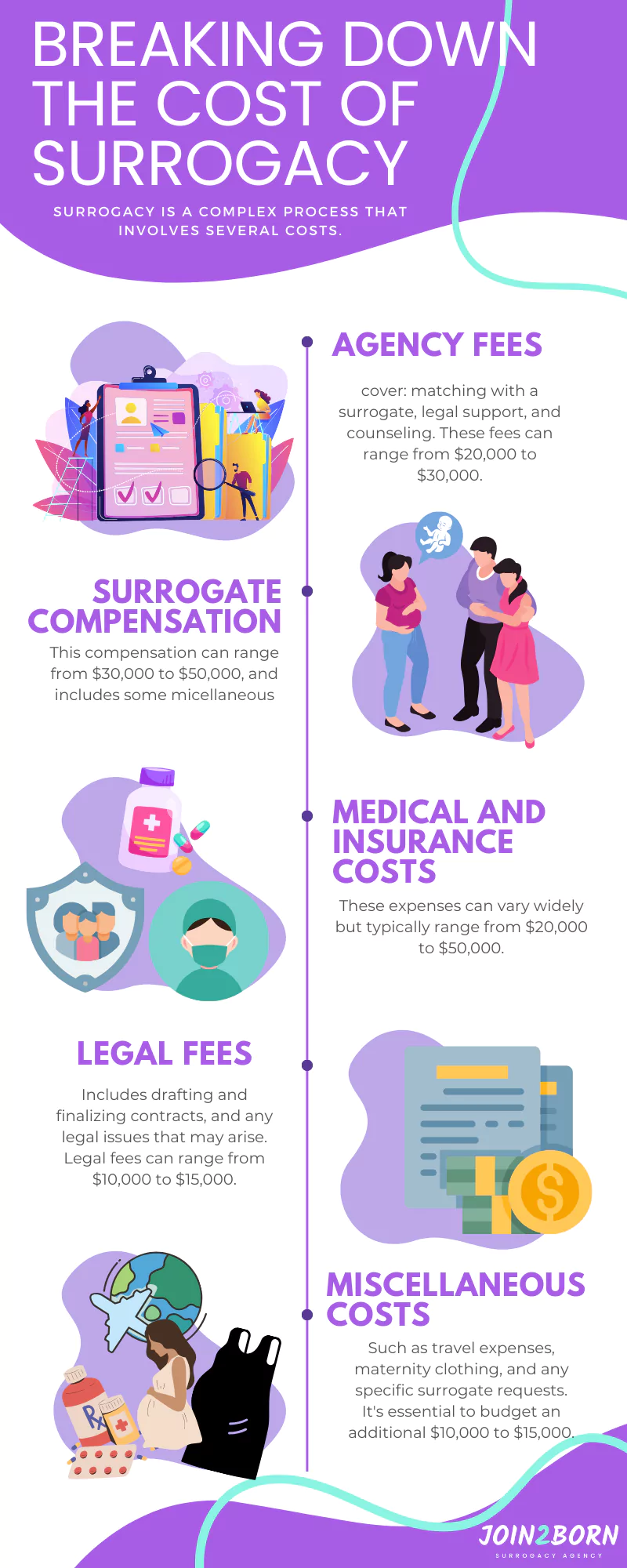
Surrogacy is a journey filled with emotional highs and lows, but beyond the emotional aspect, it’s crucial to understand the cost of surrogacy. This guide aims to break down the financial components and provide potential parents with the necessary insights to navigate this path.
Breaking Down the Cost of Surrogacy
The cost of surrogacy can vary widely depending on various factors including geographic location, agency fees, and the specific needs of your surrogacy plan. Generally, prospective parents can expect to spend anywhere from $90,000 to $130,000. It’s a hefty sum, but understanding where this money goes can help make the financial aspect of surrogacy more manageable.
Agency Fees
Most people use a surrogacy agency to facilitate the process. Agency fees typically cover services such as matching with a surrogate, legal support, and counseling. These fees can range from $20,000 to $30,000. While it might be tempting to go it alone to save money, the expertise and support of a reputable agency can be invaluable. Let’s break down these fees further:
- Matching Services
- Surrogate Selection: Agencies conduct extensive interviews, psychological evaluations, and background checks to ensure surrogates meet the health, legal, and emotional criteria. This rigorous selection process is crucial for finding a compatible match for the intending parents.
- Intended Parents Support: Agencies also support intending parents by helping them navigate their surrogacy journey, offering counseling, and ensuring they understand each step of the process.
- Coordination and Management Services
- Medical and Legal Coordination: Agencies facilitate the coordination between various professionals involved, including fertility clinics, lawyers, and mental health professionals. This coordination ensures that all aspects of the surrogacy journey are handled professionally and efficiently.
- Logistical Support: Agencies assist with scheduling appointments, arranging travel, and ensuring that all parties are informed and prepared for each step of the surrogacy process.
- Support and Counseling
- Emotional Support: Surrogacy can be emotionally challenging. Agencies provide counseling and support groups for both surrogates and intending parents to help them navigate the emotional highs and lows of the journey.
- Conflict Resolution: Should any disagreements or misunderstandings arise between the surrogate and the intending parents, the agency is there to mediate and find a resolution that respects the interests of all parties.
- Legal and Administrative Services
- Contract Facilitation: Agencies help in drafting, reviewing, and finalizing surrogacy contracts, ensuring that the rights and responsibilities of all parties are clearly outlined and legally binding.
- Financial Management: Some agencies offer escrow services, managing the financial transactions between the intending parents and the surrogate, ensuring transparency and accountability.
Choose a reputable surrogacy agency and gain not just a service, but peace of mind. Let experienced professionals handle the intricacies of your surrogacy journey, while you focus on the joy of becoming a parent. Begin this beautiful journey today – your future family awaits.”
Surrogate Compensation
Surrogates provide an incredible service and are compensated for their time, effort, and the physical and emotional investments they make. This compensation can range from $30,000 to $50,000, depending on the surrogate’s experience and the state or country’s regulations.
Surrogate compensation is multifaceted, reflecting the significant commitment a surrogate makes. It typically includes:
- Emotional and Physical Commitment: The base compensation recognizes the surrogate’s dedication and the physical and emotional challenges she may face. It compensates her for carrying the child, including the risks and the changes to her body and lifestyle.
- Experience Factor: The compensation can vary based on the surrogate’s experience. A first-time surrogate may receive a different amount compared to a seasoned surrogate who has successfully completed surrogacy journeys before.
It’s crucial for the intended parents and the surrogate to have a clear, written agreement detailing the compensation package. This ensures transparency and that the surrogate feels valued and supported throughout the process, reinforcing a positive and respectful relationship between her and the intending parents.
Medical and Insurance Costs
Medical costs can be one of the most significant expenses in the cost of surrogacy. This includes fertility treatments, pregnancy, childbirth, and any unforeseen medical issues. It’s also important to consider the insurance coverage for the surrogate, which can add to the total cost. These expenses can vary widely but typically range from $20,000 to $50,000.
Detailed Breakdown of Medical and Insurance Costs
- Fertility Treatments
- In Vitro Fertilization (IVF): This is often the most significant medical expense in surrogacy. The cost includes hormonal treatments, egg retrieval, embryo creation, and transfer. The price can vary greatly depending on how many cycles are needed and the specific medical procedures involved.
- Egg or Sperm Donation: If the intended parents require donor eggs or sperm, this adds additional costs. These can include compensation for the donor, as well as associated medical expenses for the retrieval and fertilization process.
- Prenatal Care
- Routine Check-ups: Regular medical appointments are necessary to monitor the health of the surrogate and the fetus. This includes ultrasounds, blood tests, and other prenatal screenings.
- Specialist Consultations: If complications arise or if the surrogate requires special medical attention, consultations with specialists may be necessary, adding to the overall costs.
- Delivery and Hospital Stay
- Childbirth Expenses: The cost for the delivery of the baby can vary significantly depending on the type of birth (natural vs. cesarean), the length of the hospital stay, and any unforeseen complications that may arise.
- Neonatal Care: If the baby requires additional medical attention post-birth, such as a stay in the neonatal intensive care unit (NICU), costs can increase substantially.
- Insurance Coverage
- Surrogate Health Insurance: It’s crucial to ensure that the surrogate has comprehensive health insurance that covers pregnancy and surrogacy. If her existing policy does not cover surrogacy-related medical costs, a new policy or a surrogacy-specific rider may be required.
- Life Insurance: Many surrogacy agreements also include a life insurance policy for the surrogate, providing additional security for her and her family.
- Miscellaneous Medical Expenses
- Medications and Supplements: Throughout the pregnancy, the surrogate may require various medications, vitamins, and supplements, all of which contribute to the overall medical costs.
- Travel Expenses for Medical Appointments: If the surrogate needs to travel for appointments, especially if the clinic is in a different city or state, these expenses need to be considered as well.
Thorough planning and clear communication between the intended parents and the surrogate can help manage these expenses effectively. By understanding these costs in detail, intending parents can better prepare for the financial aspects of the surrogacy journey, ensuring a smoother and more secure process for everyone involved.
Legal Fees
Legal fees are another crucial component of the overall cost of surrogacy. This includes drafting and finalizing contracts, parental order applications, and any legal issues that may arise. Legal fees can range from $10,000 to $15,000.
Comprehensive Legal Support in Surrogacy
- Drafting and Reviewing Contracts
- Surrogacy Agreement: This document is vital as it outlines the rights, responsibilities, intentions, and expectations of both the intended parents and the surrogate.
- Parentage Orders: Legal fees also cover the preparation and filing of documents necessary to establish the intended parents’ legal rights to the child. The complexity and costs can vary significantly depending on the state or country’s laws.
- Legal Representation
- Representation for Both Parties: In many jurisdictions, it’s required or highly recommended that both the surrogate and the intended parents have separate legal representation. This ensures that the contract is fair and that both parties fully understand their rights and obligations.
- Consultation and Mediation: Legal fees also include consultations throughout the surrogacy journey and mediation services if any disputes arise between the intended parents and the surrogate.
- Additional Legal Services
- Insurance Review: Lawyers may also review or help secure appropriate insurance for the surrogate, ensuring that her medical and health needs are adequately covered without undue liability on the intended parents.
- Birth Registration: Legal services include advising on and facilitating the process of birth registration and obtaining a birth certificate, ensuring that the intended parents are listed as the legal parents.
Miscellaneous Costs
There are also miscellaneous costs to consider, such as travel expenses, maternity clothing, and any specific surrogate requests. These can add up, so it’s essential to budget an additional $10,000 to $15,000 for these unforeseen expenses.

Your journey of a thousand miles begins with a single, hopeful step. While the road of surrogacy unfolds with many questions, especially around finances, remember, you’re not navigating this path alone. Curious about easing the journey’s costs? Let’s uncover answers together.
How to Finance Your Surrogacy Journey
Expanding on how to finance your surrogacy journey is crucial for intending parents, as it can often be the most daunting aspect of the process. By breaking down various financing options and strategies, intending parents can develop a plan that suits their financial situation, making the dream of expanding their family through surrogacy a more achievable reality.
Detailed Strategies for Financing Your Surrogacy Journey
1. Savings and Personal Finance: Building Your Foundation
Using personal savings or obtaining a personal loan can be a viable option for many.. Here are a few tips:
- Long-Term Planning: Start saving as early as possible. Consider setting up a dedicated surrogacy savings account and contribute to it regularly.
- Budget Review: Analyze your current spending and identify areas where you can cut back. Redirecting these funds into your surrogacy savings can accelerate your financial readiness.
- Financial Products: Look into high-interest savings accounts, CDs, or money market accounts to grow your surrogacy fund faster.
2. Fundraising and Grants: Community and Support Networks.
Crowdfunding platforms or fertility grants can provide financial assistance. Leveraging your community can also play a part in your financing plan:
- Online Fundraising: Platforms like GoFundMe allow you to share your story and raise funds from friends, family, and even strangers moved by your journey.
- Fertility Grants: Numerous organizations offer grants specifically for those struggling with infertility or pursuing surrogacy. These grants can cover a portion of the costs and significantly reduce your financial burden.
3. Healthcare Loans and Financing: Tailored Financial Solutions.
Specialized loans designed for fertility treatments and surrogacy can offer manageable repayment terms. Also specialized financial products can be a lifeline for many intending parents:
- Fertility Financing Programs: These programs are specifically designed to cover fertility treatments and surrogacy expenses, often offering competitive interest rates and flexible repayment terms.
- Personal Loans: While not specifically for fertility, personal loans can provide the necessary funds with varying interest rates based on your creditworthiness.
4. Employer Benefits: A Potential Untapped Resource.
Some companies provide fertility benefits, including surrogacy support, so check with your employer.
- Fertility Benefits: A growing number of companies include fertility treatment coverage in their health plans, which can sometimes be applied towards surrogacy-related medical expenses.
- Financial Assistance Programs: Ask your HR department about any available employee assistance programs that could help with the costs of surrogacy.
5. Alternative Financing Options: Creative Solutions.
When traditional financing routes are not enough, consider alternative solutions:
- Home Equity: If you own a home, tapping into your home equity can be a cost-effective way to finance your surrogacy journey.
- Retirement Funds: Borrowing against your retirement savings is another option, but be cautious of the implications for your future financial security.

Maximizing Your Financing Plan
Combining various financing strategies can give you the best chance of covering the cost of surrogacy without overwhelming financial stress. Here are additional tips:
- Financial Advisor: Consulting with a financial advisor experienced in surrogacy can provide personalized advice and help you navigate the complex financial landscape.
- Tax Implications: Some surrogacy expenses may be tax-deductible, so consult with a tax professional to understand your options and potential savings.
- Cost-Sharing and Discounts: Negotiate with service providers for possible discounts or explore cost-sharing options with your surrogacy agency.
The cost of surrogacy is undoubtedly high, but understanding and planning for these expenses can make the dream of parenthood a reality. It’s also a reminder of the incredible journey surrogates and intending parents embark on together, a journey of hope, love, and the ultimate gift of life.
Navigating Financial Challenges: Making Surrogacy Affordable
The journey to parenthood through surrogacy is marked by significant financial considerations. However, with the right strategies and an understanding of where to find support, managing the cost of surrogacy can become a more navigable path.
Creating a Surrogacy Budget
The first step in managing the cost of surrogacy is creating a detailed budget. Start by listing all potential expenses: agency fees, surrogate compensation, medical and insurance costs, legal fees, and any additional expenses like travel or maternity clothes. Having a clear picture can prevent unexpected costs and provide a realistic understanding of the financial commitment required.
Tips for Budgeting and Saving
- Prioritize Expenses: Determine what aspects of the surrogacy process are most important to you and allocate your funds accordingly.
- Cut Unnecessary Costs: Look for areas where you can save money, such as opting for more affordable travel options or seeking second-hand maternity clothes for your surrogate.
- Set Up a Dedicated Savings Account: Keep your surrogacy funds separate from your regular bank accounts to avoid unnecessary spending and track your savings progress.
Financial Assistance and Support
While the cost of surrogacy is undeniably high, there are resources available to help alleviate some financial burdens:
- Grants and Scholarships: Many organizations offer grants to help cover the costs of surrogacy. These can be competitive, but they are worth exploring.
- Fundraising: Platforms like GoFundMe can be used to raise money from friends, family, and the community.
- Employer Benefits: As mentioned earlier, some employers offer fertility benefits, including surrogacy support, which can significantly reduce costs.
Alternative Financing Options
If savings and financial assistance are not enough to cover the full cost of surrogacy, alternative financing options may be necessary:
- Fertility Loans: Specialized fertility loans are available and designed specifically to cover the costs of treatments like surrogacy.
- Home Equity Loans: If you own a home, a home equity loan can provide a lower interest rate compared to personal loans or credit cards.
- Retirement Funds: While not ideal, some people may consider borrowing from their 401(k) or IRA. However, be aware of the potential penalties and long-term impacts on your retirement savings.
Final Thoughts on Managing the Cost of Surrogacy
The financial aspects of surrogacy can be daunting, but they should not deter you from pursuing your dream of parenthood. With careful planning, diligent saving, and the help of financial assistance programs, the cost of surrogacy can manage. Remember, you’re investing in the future of your family, and the rewards, though intangible, are immeasurable.
As you embark on this journey, keep in mind that while the cost of surrogacy is significant, the process is about creating life and fulfilling dreams. It’s a path walk with love, determination, and the hope of bringing a new life into the world.
FAQ´s
The average cost varies widely, typically ranging from $90,000 to $130,000, depending on services and location.



